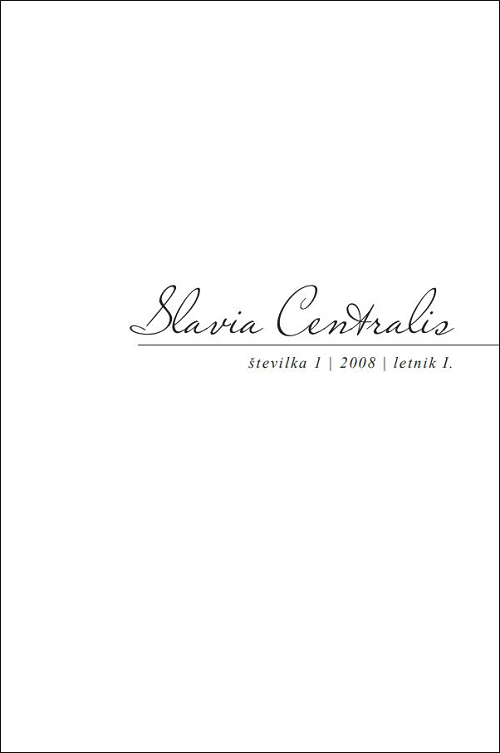Medkulturnost protestantske književnosti
Abstract
Interkulturalität der protestantischen Literatur. Der Aufsatz thematisiert die Wirkungen der protestantischen Literatur auf die Transformation der ständisch definierten kulturellen Felder in der zweiten Hälfte des 16. Jahrhunderts. Im Gegensatz zum allgemeinen Muster ist hier auf allen relevanten Ebenen (symbolische Ordnung, Identitätskonzepte, soziale Strukturen, Medien) eine Tendenz zur überwindung der ständischen Hierarchie zu beobachten. Protestantische Literatur trägt somit durch die Mechanismen der Interkulturalität zur funktionalen Erweiterung des sozialen Raumes bei.
Downloads
References
Kozma AHAČIČ, 2007: Zgodovina misli o jeziku in književnosti na Slovenskem: protestantizem. Ljubljana: Znanstvenoraziskovalni center SAZU.
Pierre BOURDIEU, 2000: The Rules of Art: Genesis and Structure of the Literary Field. Prevod Susan Emanuel. Stanford: Stanford University Press.
Homi K. BHABHA, 1994: The Location of Culture. London and New York: Routledge.
Dejan KOS, 2008: Literarna zgodovina med narativnostjo in interdisciplinarnostjo. Primerjalna književnost 31. 75–99.
Marko JUVAN, 2003: O usodi 'velikega' žanra. Kako pisati literarno zgodovino danes? Ur. Darko Dolinar in Marko Juvan. Ljubljana: ZRC SAZU. 17–49.
Niklas LUHMANN, 2005: Soziologische Aufklärung: Aufsätze zur Theorie sozialer Systeme. 3. Auflage, Köln-Opladen: Westdeutscher Verlag.
Boris PATERNU, 2008: Trubarjeva prebuja individualne, nacionalne in globalne identitete. Slovenščina med kulturami. Ur. Miran Košuta. Slovenski slavistični kongres. Celovec; Pliberk. Ljubljana: Slavistično društvo Slovenije. 15–24.
Talcott PARSONS, 1971: The System of Modern Societies. Engelwood Cliffs, NJ: Prentice-Hall.
Siegfried J. SCHMIDT, 1994: Kognitive Autonomie und soziale Orientierung. Frankfurt/M.: Suhrkamp.
Copyright (c) 2008 University of Maribor, University Press

This work is licensed under a Creative Commons Attribution-NonCommercial 4.0 International License.
Copyrights
Authors of accepted manuscripts will retain copyright in their work, but will assign to Slavia Centralis the permanent right to electronically distribute their article. Authors may republish their work (in print and/or electronic format) as long as they acknowledge Slavia Centralis as the original publisher. Authors may also share the published version on their own websites, departmental webpages, or institutional repositories.
Plagiarism Policy
Slavia Centralis is a non-commercial, open access, electronic research journal. As such it pledges to uphold certain ethical principles regarding confidentiality, originality and intellectual fair play. Slavia Centralis takes copyright infringement and plagiarism very seriously and all submissions may be checked with duplication detection software.
Authors must:
- Ensure that all work submitted is original, fully referenced and that all authors are represented accurately. The submission must be exclusive and not under consideration elsewhere.
- Obtain all permissions from copyright owners for 3rd party material (e.g. quotations, illustrations, tables, etc.).
